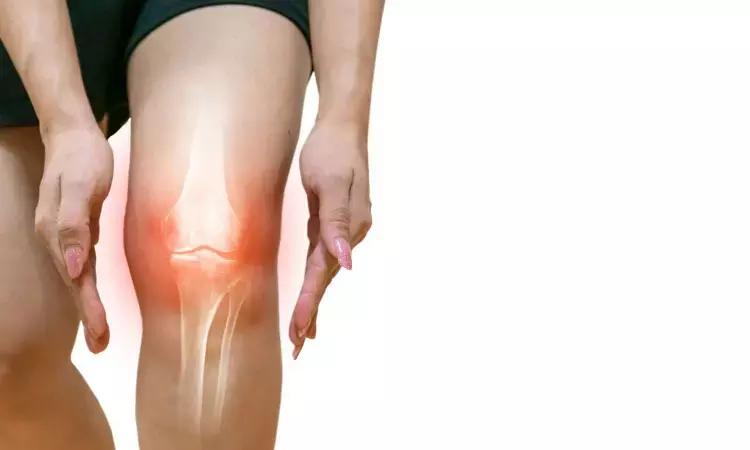- Home
- Medical news & Guidelines
- Anesthesiology
- Cardiology and CTVS
- Critical Care
- Dentistry
- Dermatology
- Diabetes and Endocrinology
- ENT
- Gastroenterology
- Medicine
- Nephrology
- Neurology
- Obstretics-Gynaecology
- Oncology
- Ophthalmology
- Orthopaedics
- Pediatrics-Neonatology
- Psychiatry
- Pulmonology
- Radiology
- Surgery
- Urology
- Laboratory Medicine
- Diet
- Nursing
- Paramedical
- Physiotherapy
- Health news
- Fact Check
- Bone Health Fact Check
- Brain Health Fact Check
- Cancer Related Fact Check
- Child Care Fact Check
- Dental and oral health fact check
- Diabetes and metabolic health fact check
- Diet and Nutrition Fact Check
- Eye and ENT Care Fact Check
- Fitness fact check
- Gut health fact check
- Heart health fact check
- Kidney health fact check
- Medical education fact check
- Men's health fact check
- Respiratory fact check
- Skin and hair care fact check
- Vaccine and Immunization fact check
- Women's health fact check
- AYUSH
- State News
- Andaman and Nicobar Islands
- Andhra Pradesh
- Arunachal Pradesh
- Assam
- Bihar
- Chandigarh
- Chattisgarh
- Dadra and Nagar Haveli
- Daman and Diu
- Delhi
- Goa
- Gujarat
- Haryana
- Himachal Pradesh
- Jammu & Kashmir
- Jharkhand
- Karnataka
- Kerala
- Ladakh
- Lakshadweep
- Madhya Pradesh
- Maharashtra
- Manipur
- Meghalaya
- Mizoram
- Nagaland
- Odisha
- Puducherry
- Punjab
- Rajasthan
- Sikkim
- Tamil Nadu
- Telangana
- Tripura
- Uttar Pradesh
- Uttrakhand
- West Bengal
- Medical Education
- Industry
GLP-1RA Therapy Effective in Combating Knee Osteoarthritis in T2D Patients

Obesity has long been known as a risk factor for the development and progression of knee osteoarthritis (KOA). However, a recent research from the Shanghai Osteoarthritis Cohort study suggests that Glucagon-like peptide-1 receptor agonists (GLP-1RAs), commonly used to treat type 2 diabetes mellitus (T2DM) and obesity, may offer significant benefits to KOA patients, especially when it comes to long-term treatment. The findings were published in the
In a prospective, observational, multicenter study involving over 40,000 adults with clinically diagnosed osteoarthritis aged over 45 years in Shanghai, researchers focused on identifying KOA patients with comorbid T2DM enrolled between January 2011 and January 2017. The primary outcome of the study was the incidence of knee surgery after enrollment, while secondary outcomes included pain-relieving medication use, intra-articular therapies, Western Ontario and McMaster Universities Osteoarthritis Index (WOMAC), and medial femorotibial joint cartilage thickness.
The findings revealed that KOA patients treated with GLP-1RAs experienced significant improvements compared to those without exposure to this therapy. One notable benefit was substantial weight loss, with an adjusted mean difference in weight change from baseline of -7.29 kg (95% CI -8.07 to -6.50 kg, p<0.001). The GLP-1RA group also exhibited a lower incidence of knee surgery, with only 1.7% requiring surgery compared to 5.9% in the non-GLP-1RA group (adjusted p=0.014).
Moreover, the WOMAC total and pain subscale scores showed significant improvements in the GLP-1RA-treated group, indicating better overall joint function and reduced pain. The cartilage-loss velocity of the medial femorotibial joint was also significantly lower in the GLP-1RA group, suggesting a potential disease-modifying effect of the therapy.
In an additional before-and-after comparison within the GLP-1RA group, researchers observed a significant decrease in symptom-relieving medication consumption and cartilage loss velocity of the medial femorotibial joint. This indicates that GLP-1RA therapies may not only mitigate KOA symptoms but potentially modify the disease process itself.
Interestingly, the study also found that the decreased incidence of knee surgery in GLP-1RA-treated patients was predominantly mediated by weight reduction (mediation proportion: 32.1%), rather than improved glycaemic control.
Source:
Zhu, H., Zhou, L., Wang, Q., Cai, Q., Yang, F., Jin, H., Chen, Y., Song, Y., & Zhang, C. (2023). Glucagon-like peptide-1 receptor agonists as a disease-modifying therapy for knee osteoarthritis mediated by weight loss: findings from the Shanghai Osteoarthritis Cohort. Annals of the Rheumatic Diseases. https://doi.org/10.1136/ard-2023-223845
Neuroscience Masters graduate
Jacinthlyn Sylvia, a Neuroscience Master's graduate from Chennai has worked extensively in deciphering the neurobiology of cognition and motor control in aging. She also has spread-out exposure to Neurosurgery from her Bachelor’s. She is currently involved in active Neuro-Oncology research. She is an upcoming neuroscientist with a fiery passion for writing. Her news cover at Medical Dialogues feature recent discoveries and updates from the healthcare and biomedical research fields. She can be reached at editorial@medicaldialogues.in
Dr Kamal Kant Kohli-MBBS, DTCD- a chest specialist with more than 30 years of practice and a flair for writing clinical articles, Dr Kamal Kant Kohli joined Medical Dialogues as a Chief Editor of Medical News. Besides writing articles, as an editor, he proofreads and verifies all the medical content published on Medical Dialogues including those coming from journals, studies,medical conferences,guidelines etc. Email: drkohli@medicaldialogues.in. Contact no. 011-43720751


